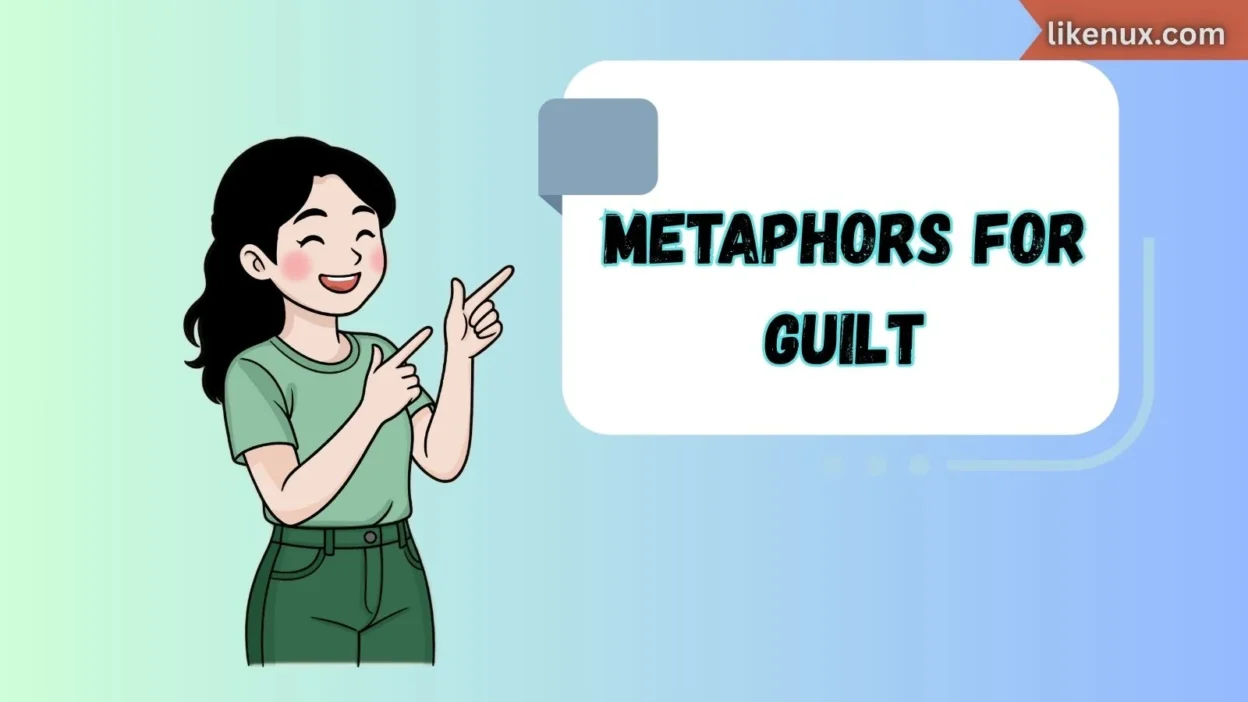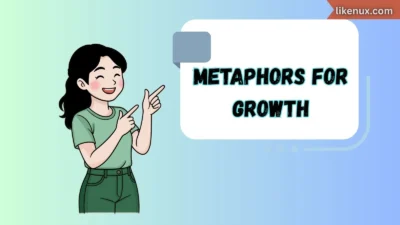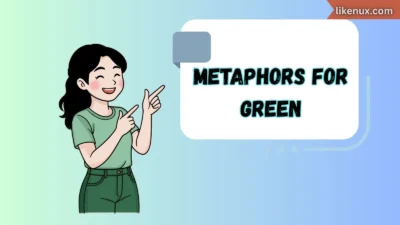Guilt is a universal human emotion that often feels heavy, unsettling, and hard to describe. Whether it stems from a mistake, a broken promise, or simply wishing we had acted differently, guilt can stay with us longer than we want. Sometimes, the right Metaphors for Guilt can help us express that weight more clearly — both to ourselves and others.
In this article, we’ll explore 25 metaphors for guilt, each one explained in simple words, with examples, best uses, and alternative phrases. These metaphors are designed to help you express guilt with warmth, care, and thoughtfulness, making it easier to connect with your own feelings or share them with others.
1. Guilt is a Shadow
Meaning: A presence that follows you everywhere.
In a Sentence: “His guilt was like a shadow that never left his side.”
Best Use: To show how guilt lingers silently but constantly.
Other Ways to Say: A constant companion, a silent follower.
2. Guilt is a Heavy Backpack
Meaning: A weight you carry around on your back.
In a Sentence: “She carried guilt like a heavy backpack she couldn’t take off.”
Best Use: To describe the burden of regret.
Other Ways to Say: A load, a burden, an emotional baggage.
3. Guilt is a Stain
Meaning: Something that marks your heart or conscience.
In a Sentence: “The guilt left a stain on his soul.”
Best Use: To show how guilt leaves a permanent mark.
Other Ways to Say: Scar, blemish, mark.
4. Guilt is a Prison
Meaning: It locks you in and limits your freedom.
In a Sentence: “Her guilt was a prison with no escape.”
Best Use: To describe feeling trapped by past actions.
Other Ways to Say: A cage, confinement, captivity.
5. Guilt is a Storm
Meaning: Chaotic emotions swirling inside you.
In a Sentence: “His guilt was a storm he couldn’t calm.”
Best Use: To explain emotional turmoil.
Other Ways to Say: Tempest, whirlwind, chaos.
6. Guilt is a Chain
Meaning: It ties you down and restricts movement.
In a Sentence: “Her guilt was a chain she couldn’t break.”
Best Use: To describe restriction and entrapment.
Other Ways to Say: Shackles, ropes, bonds.
7. Guilt is a Thorn
Meaning: A small but painful reminder.
In a Sentence: “The guilt pricked him like a thorn.”
Best Use: To show sharp, nagging pain.
Other Ways to Say: Needle, splinter, prick.
8. Guilt is a Ghost
Meaning: A haunting memory that won’t go away.
In a Sentence: “Her guilt was a ghost that visited her every night.”
Best Use: To show how guilt haunts and revisits.
Other Ways to Say: Phantom, spirit, haunting.
9. Guilt is a Stone on the Chest
Meaning: A suffocating weight pressing down.
In a Sentence: “The guilt sat on his chest like a stone.”
Best Use: To describe physical heaviness of guilt.
Other Ways to Say: Rock, boulder, pressure.
10. Guilt is a Knot
Meaning: Something tangled up inside you.
In a Sentence: “Her guilt twisted her stomach into knots.”
Best Use: To describe inner turmoil and anxiety.
Other Ways to Say: Tangle, snarl, twist.
11. Guilt is an Anchor
Meaning: Something that drags you down.
In a Sentence: “The guilt anchored him to his past.”
Best Use: To show being held back by regret.
Other Ways to Say: Weight, drag, ballast.
12. Guilt is a Mirror
Meaning: It reflects back your mistakes.
In a Sentence: “Her guilt was a mirror showing her failures.”
Best Use: To highlight self-reflection and shame.
Other Ways to Say: Reflection, reminder, truth-teller.
13. Guilt is a Bruise
Meaning: A tender spot that hurts when touched.
In a Sentence: “His guilt was a bruise that never healed.”
Best Use: To show sensitivity and lingering pain.
Other Ways to Say: Wound, sore, mark.
14. Guilt is a Weight on the Shoulders
Meaning: An emotional burden.
In a Sentence: “She walked with guilt weighing down her shoulders.”
Best Use: To describe carrying responsibility or regret.
Other Ways to Say: Load, burden, heaviness.
15. Guilt is a Fire
Meaning: It burns inside and causes pain.
In a Sentence: “His guilt burned like fire in his chest.”
Best Use: To describe intense emotional pain.
Other Ways to Say: Flame, spark, blaze.
16. Guilt is a Fog
Meaning: It clouds your clarity and vision.
In a Sentence: “Her guilt was a fog that blurred her judgment.”
Best Use: To describe confusion and emotional cloudiness.
Other Ways to Say: Mist, haze, smoke.
17. Guilt is a Whisper
Meaning: A quiet but persistent voice.
In a Sentence: “His guilt whispered reminders in his mind.”
Best Use: To describe subtle but constant reminders.
Other Ways to Say: Murmur, echo, voice.
18. Guilt is a Chain Reaction
Meaning: One mistake leads to another consequence.
In a Sentence: “Her guilt set off a chain reaction of self-doubt.”
Best Use: To explain how guilt multiplies and spreads.
Other Ways to Say: Domino effect, ripple, spiral.
19. Guilt is a Dark Cloud
Meaning: A gloom that hangs over you.
In a Sentence: “A dark cloud of guilt followed him everywhere.”
Best Use: To show mood and depression linked to guilt.
Other Ways to Say: Gloom, shadow, overcast.
20. Guilt is a Lock
Meaning: It prevents you from moving forward.
In a Sentence: “Her guilt locked her in the past.”
Best Use: To show inability to progress.
Other Ways to Say: Barrier, blockade, seal.
21. Guilt is a Weight in the Stomach
Meaning: A sinking, heavy feeling inside.
In a Sentence: “His guilt sat in his stomach like a stone.”
Best Use: To describe physical manifestation of regret.
Other Ways to Say: Pit, lump, heaviness.
22. Guilt is a Cold Wind
Meaning: A chilling, uncomfortable presence.
In a Sentence: “Her guilt blew through her life like a cold wind.”
Best Use: To describe emotional discomfort.
Other Ways to Say: Chill, draft, breeze.
23. Guilt is an Echo
Meaning: It repeats again and again in your mind.
In a Sentence: “His guilt echoed with every decision he made.”
Best Use: To show repetition of past mistakes.
Other Ways to Say: Refrain, repeat, reminder.
24. Guilt is a Tidal Wave
Meaning: It overwhelms you suddenly.
In a Sentence: “The guilt hit her like a tidal wave.”
Best Use: To describe overpowering emotions.
Other Ways to Say: Flood, surge, tsunami.
25. Guilt is a Dark Room
Meaning: A place of isolation and fear.
In a Sentence: “His guilt kept him locked in a dark room of loneliness.”
Best Use: To show emotional isolation.
Other Ways to Say: Void, emptiness, silence.
FAQs About Guilt
1. Why does guilt feel so heavy?
Because guilt often ties into responsibility, regret, and empathy, it feels like a weight pressing on both the mind and body.
2. Can guilt be healthy?
Yes. Healthy guilt can guide us to make better choices, apologize, or correct our mistakes.
3. How do metaphors help with guilt?
Metaphors provide a language for emotions, making them easier to process and share with others.
4. What’s the difference between guilt and shame?
Guilt is feeling bad for what you did; shame is feeling bad for who you are.
5. How can I overcome guilt?
By acknowledging it, learning from it, making amends if possible, and practicing self-compassion.
Conclusion
Guilt is something we all face, and it often feels like a shadow, a weight, or a storm in our lives. But by putting words to it, we can better understand and manage it. These 25 metaphors for guilt are not just expressions — they are tools to help you connect with your emotions, explain them to others, and even begin to heal.
Remember, guilt doesn’t define you. It’s simply a signal — one that can guide you toward growth, forgiveness, and self-compassion.

Andrew Christopher is a passionate visionary who blends creativity with purpose to bring ideas to life. With a focus on innovation and integrity, he inspires growth and lasting impact.



